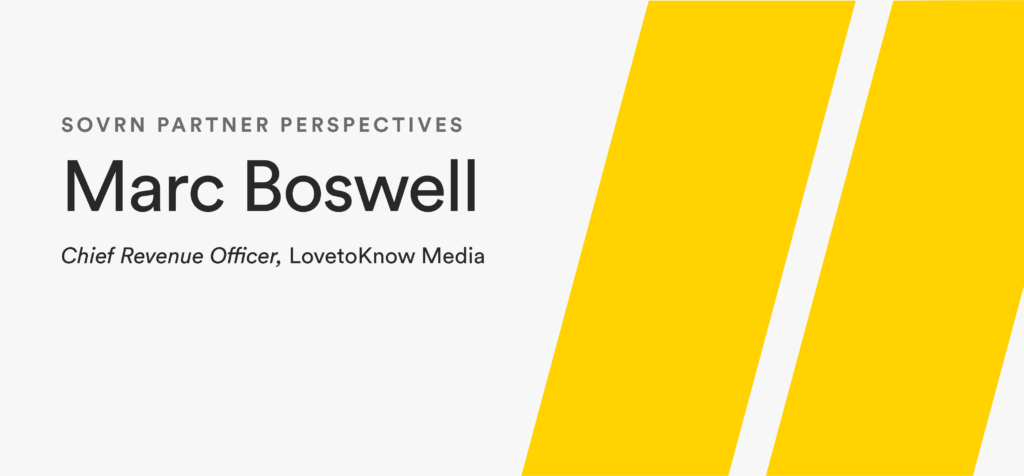Earlier this year, Sovrn announced the creation of a new steering committee, composed of leading publishers like Ziff Davis, LoveToKnow Media, Publishers Clearing House, and more. Their mission: to collaboratively tackle the biggest challenges facing publishers today and help innovate the products publishers truly need from their ad tech partners.

With access to some of the best minds in the business, we wanted to tap into their valuable expertise and share those insights with all of you. We recently sat down with Marc Boswell, Chief Revenue Officer at LoveToKnow Media, to get his thoughts on the state of the digital advertising industry.
Q: In your role with LoveToKnow Media, what are your top priorities and where are you planning to focus your energy over the next 12-18 months?
A: A few key initiatives are top of mind right now. First, we’re looking for ways to work with our partners to overcome the death of the cookie. It’s actually here this time! As a midsized publisher, we can’t change the industry on our own, so we’re working to get our partners out of the mindset of buying third-party audiences — which were never that good to begin with. We want to show them a viable alternative, which is working with publishers who know their audiences better than a third party ever could. The question is, how do you do that at scale?
Second, we’re finding ways to create curated marketplaces from all that data, to help mid-tier publishers who don’t have the resources to employ a sales team to set up deals directly with each agency. And, we’re launching a supply path optimization experiment to remove all of our resellers and create a more efficient path for buyers. Our industry is very cluttered and there are a lot of “tech taxes” between buyers and publishers — so we’re trying to eliminate as many of those as possible.
Q: From your perspective, what are the top challenges facing publishers today?
A: A big one that’s come up for us recently is sequential liability. In the wake of the MediaMath collapse, some partners are saying they will claw back a portion of our earnings, because they aren’t getting paid. Hopefully this will all be resolved with the recent acquisition, but publishers bear the full brunt of those situations because they don’t control which buyers are buying their ads. Regular health check-ins could help us avoid a repeat of this situation.
Another is how to keep mid-tier, independent publishers thriving. The big names in the industry get most of the attention, but mid-sized publishers are producing a lot of great content readers value. Subscription monetization strategies won’t work for them, so how do we set those brands up for success when third-party cookies are gone?
Q: What should publishers be doing right now to meet those challenges?
A: They need to work together. A lot of solutions are going to come through collaboration, both with your publisher cohort and your supply-side partners. These aren’t just challenges for one publisher or one segment of publishers — they’re challenges for all of us. We need to overcome this mindset of secrecy, because the more we work together with our peers the better those solutions will be — for both the buy side and the sell side.
Most importantly, it will help to clarify for supply-side partners what publishers are really looking for. If they hear from one publisher, it won’t have much impact. But if they hear the same thing from many publishers, something is more likely to happen. As a single publisher, I can’t go to the buy side and offer my seller-defined audiences (SDA) or my standard cohorts. But if 10 or 100 publishers can do things consistently through an SSP — whether that’s curated marketplaces, or SDAs, or bid enrichment, or maybe something that hasn’t been invented yet — that’s how we overcome the loss of third-party cookies.
Q: As you look ahead, what are you most excited about for the industry?
A: The death of the third-party cookie! It’s one of the most inefficient methods you could imagine for audience targeting. At this point, it’s really nothing more than a security blanket — and remember, on Apple devices we’re already living in a cookieless world. So there may be fear and uncertainty in the short term, but once we get past that I think we’ll see a better balance between Android CPMs (coming down) and Apple CPMs (coming up). I’m excited to work with other publishers and our supply-side partners to find better paths for buyers to discover inventory and more accurate ways to target audiences in the absence of third-party cookies. Once all the dust settles, I think we could be in a much better place than we are now.
Q: What made you want to join Sovrn’s publisher steering committee?
A: I like that Sovrn is working to create a platform that really works for publishers. They’re trying to solve many of the real-life problems that publishers face — like a unified way to see performance data and analytics in one place, addressability, curated marketplaces, and bid enrichment. I like that they’re committed to being a one-stop shop for publishers to manage their inventory and audience — especially publishers like me, who deal with so much more than programmatic. We also have outside partners, and a commerce team, and various business units — each of which has its own partners. Sovrn is trying to help us bring it all together and see what’s going on at a high level. There’s a lot of work to do, but I hope my input can help them conceptualize what publishers need.
Q: What’s been your experience so far with the steering committee, and how would you like to see it evolve over time?
A: Through my involvement with the steering committee, I’ve seen the product as it’s being developed. I like where it’s headed and it gets better every time I see it. You can tell they’re listening to publisher feedback and adapting the product based on what they hear. I appreciate that.
Q: Why do you think groups like this are important, especially in the current market environment?
A:.Every perspective is valid and there’s never going to be a one-size-fits-all solution. So we should all be talking openly and looking for points of commonality. With all the fragmentation in the market today, we’ve lost our collaborative mindset to a certain degree. We need to sit down and have honest conversations that represent every group — large publishers, small publishers, ad tech, buy side — and find ways to address what needs to be fixed.
For more insights to help you grow your business on the open web, visit the Sovrn blog. You can also contact us at sales@sovrn.com for more information about our comprehensive suite of publisher solutions for advertising, commerce, and data.

